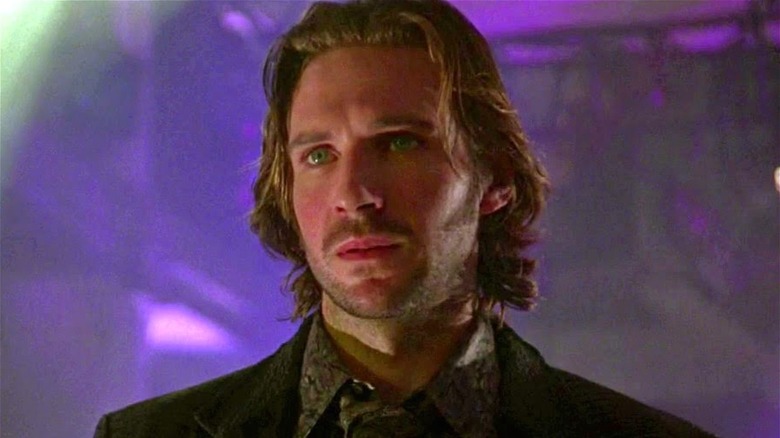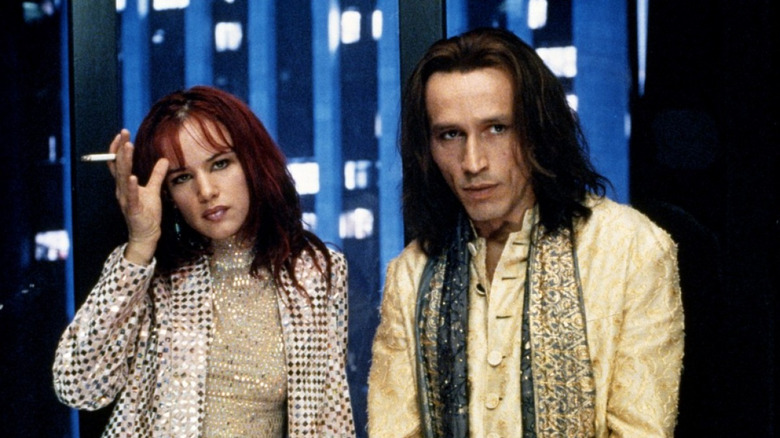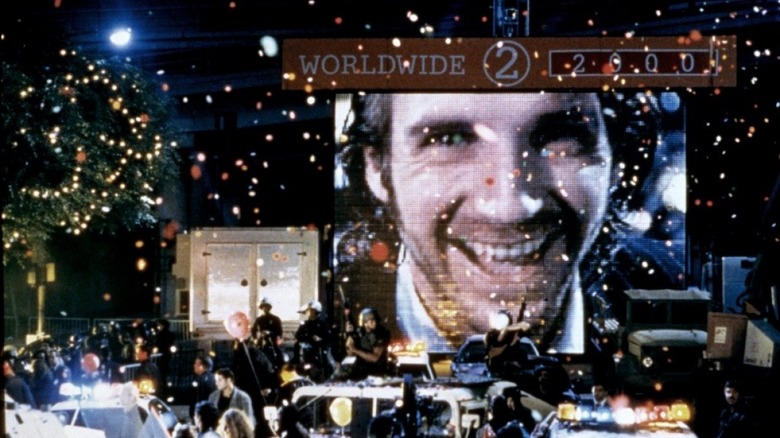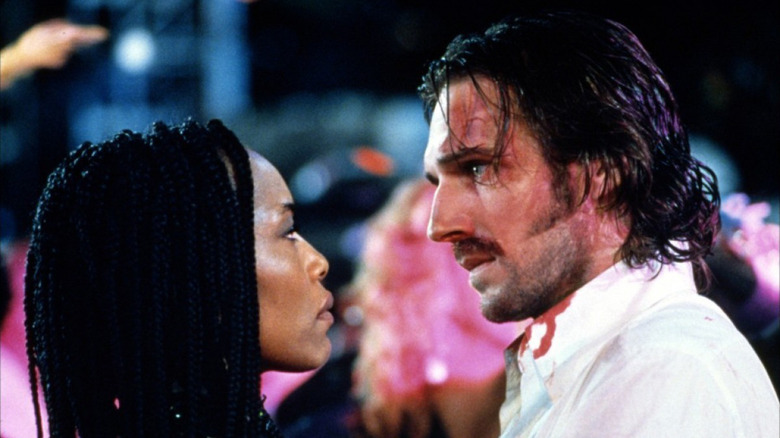The Idea For Strange Days Came To James Cameron Nearly A Decade Before The Film Would Be Made
Dystopian science fiction movies often reveal as much about the time they were made as the future they are predicting, although few films have the poles set as closely together as Kathryn Bigelow's "Strange Days." Controversial at the time for its disturbing depiction of sexual violence and racial injustice, the dark neo-noir was released in 1995, slap-bang between its incendiary vision of a society teetering on the brink of chaos at the turn of the millennium and the incident that provided a catalyst to get it to the screen, namely the brutal beating of Rodney King by LAPD officers in 1991.
Reaction from critics was mixed, often praising its atmosphere and technical prowess while questioning Bigelow's judgment and motives, and audiences didn't really know what to do with it. As a result, it bombed at the box office, making back just $8 million against its $42 million budget (via Box Office Mojo).
It's an overused phrase, but "Strange Days" was truly a film ahead of its time. Like many of the best science fiction movies, it has become only more prescient as the real world's timeline overtook its nominal future-shock setting, while also giving us a volatile glimpse of the era in which it was made. It's a movie that pulses with the anarchic energy of the L.A. riots that followed the acquittal of the officers involved in the King assault and thrums with the edgy uncertainty that accompanied the clock ticking down to the new millennium. As much about the then-present as the future, it was as if Bigelow was saying: "Dystopia is here and now." Which all begs the question, would the film have the same sense of raw immediacy if it was made when James Cameron originally had the idea back in the mid-'80s?
So what happens in Strange Days again?
"Strange Days" is set in Los Angeles during the last few days of the 20th Century and the city is ready to blow up. Citizens are on the verge of violent civil disobedience while riot cops prowl the streets, cars are set alight while stores are looted, and even Santa gets mugged right out in the open. Relishing this turbulent milieu is Lenny Nero (Ralph Fiennes), a former LAPD vice squad detective turned seedy dealer of "clips," or first-hand experiences recorded directly from the cerebral cortex by the wearer of a SQUID (Super-conducting Quantum Interference Device).
The tech makes just about any experience possible for Lenny's clients, but they are mostly drawn to the seamier side of humanity. Lenny has no qualms about selling it to them, although he just about draws the line at snuff clips. His line of business earns the constant disapproval of his best friend Mace (Angela Bassett), a hardworking limo driver who holds a candle for him. After a hard day's peddling, he likes to kick back with a bottle of liquor and torture himself with clips of his ex, Faith (Juliette Lewis). She's a singer now dating Philo (Michael Wincott), a sinister music promoter whose number one client, rapper Jeriko One (Glenn Plummer), was seemingly gunned down in a gang-related incident.
Meanwhile, an acquaintance of Lenny's is in trouble. Sex worker Iris (Brigitte Bako) is on the run from Steckler and Engelman (Vincent D'Onofrio and William Fichtner), two corrupt cops who are trying to silence her. She drops a clip disc into Lenny's car but gets killed before she can tell him about it, and her sadistic assailant also sends him a clip of her brutal murder. With his well-hidden conscience now pricked, can Lenny reveal the conspiracy before the killer pins the crime on him?
James Cameron had the idea for Strange Days back in the '80s
While "Strange Days" feels very much of its time thanks to the grungy vibe and the presence of '90s queen Juliette Lewis, the original concept came to James Cameron, Kathryn Bigelow's former husband, back in the '80s. As he explained in "The Cinema of James Cameron: Bodies in Heroic Motion":
"Lenny Nero was born in 1985 when I decided to write a film noir thriller taking place on New Year's Eve 1999. I was fascinated by the dramatic and thematic potentials of the millennium, and the idea of doomsday as a backdrop for the redemption of one individual... I called it 'The Magic Man,' because Lenny can get you anything... like magic. I never got around to writing it, at least not that decade."
When Cameron eventually developed the idea into a full treatment, he took inspiration from the Rodney King incident and made a similar gross injustice central to the mystery. He wrote it with Kathryn Bigelow in mind as they had worked together successfully on "Point Break," before they drafted in Jay Cocks to help with the screenplay. In the treatment, Cameron took aim at the growing phenomenon of reality TV:
"Reality shows and amateur video shows dominated TV programming. It is the age of scopophilia, voyeurism and vicarious living... We like to watch. It is a surveillance culture..."
Cameron expanded on the thought process in an interview with Film Comment (via Cinephilia & Beyond) by referencing the O.J. Simpson murder trial in 1995, one of the televisual events of the decade, to back up his argument. Prior to the trial, 95 million viewers tuned in to watch Simpson's attempted escape live (via Britannica). With the film also foreshadowing the death of Tupac Shakur, "Strange Days" offers a powerful reflection of its time while also prefiguring today's society.
How does Strange Days hold up?
Like "Blade Runner" before it, "Strange Days" updates classic L.A. noir with cyberpunk and neo-noir trappings, Lenny Nero stepping in for the usual down-at-heel protagonist trying to unravel a mystery and Faith giving the traditional femme fatale role some punk attitude. If it has one fault it's that the conspiracy plot is unremarkable and spread too thinly, but Kathryn Bigelow makes up for it with atmosphere and ideas. She once again proved that she is a top-notch action director, cranking the movie with a real sense of dangerous volatility as if the society we are watching could explode into out-of-control violence at any moment.
One of the most interesting aspects of the film is how its tech anticipated future developments. The key plot point of a SQUID capturing incriminating footage of two cops murdering a suspect is depressingly familiar today, especially after high-profile cases in the U.S. like George Floyd's deadly arrest, and the groundbreaking POV sequences foretold advances in virtual reality. The tech was only just becoming a commercial product at the time and has really gathered pace over the past two decades, with haptic technology enabling the user to feel textures and sensations such as heat and cold. Looking to the future, innovations such as implants to help the human brain integrate with AI could mean VR will eventually become indistinguishable from reality.
"Strange Days" is skeptical about what that might mean for the consumer; clips are portrayed almost as a drug, sold illicitly and causing users to suffer paranoia and lose touch with reality. Two characters are even killed by effectively a forced overdose that fries their brains. It's a cautionary tale by way of a thrill ride about what the future of technology might hold, and one worth bearing in mind with the exciting advances ahead.



